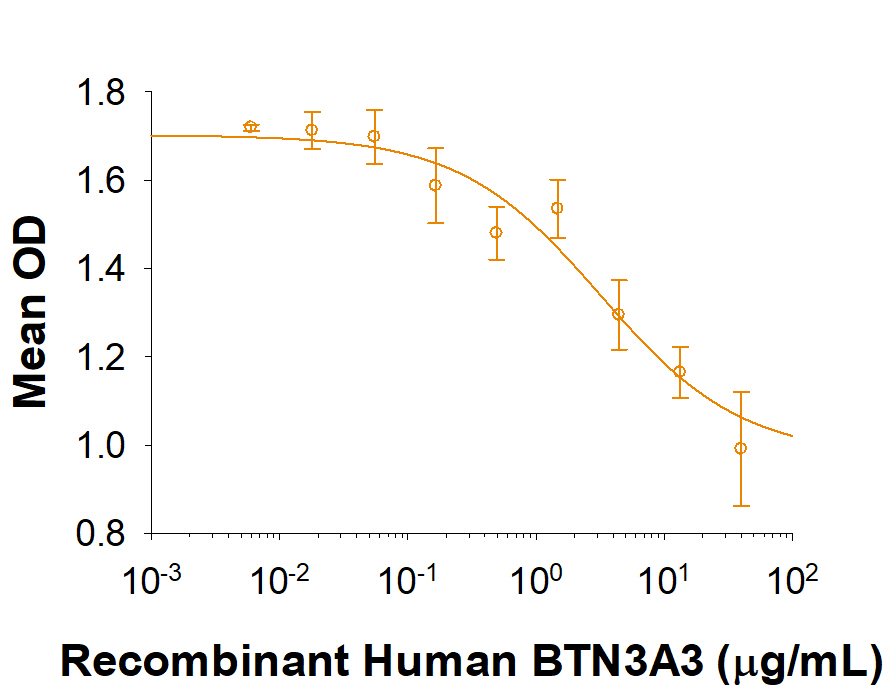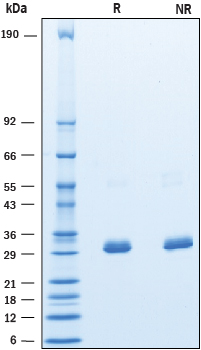Recombinant Human BTN3A3 His-tag Protein, CF Summary
Product Specifications
Gln30-Trp248, with a C-terminal 6-His tag
Analysis
Product Datasheets
Carrier Free
CF stands for Carrier Free (CF). We typically add Bovine Serum Albumin (BSA) as a carrier protein to our recombinant proteins. Adding a carrier protein enhances protein stability, increases shelf-life, and allows the recombinant protein to be stored at a more dilute concentration. The carrier free version does not contain BSA.
In general, we advise purchasing the recombinant protein with BSA for use in cell or tissue culture, or as an ELISA standard. In contrast, the carrier free protein is recommended for applications, in which the presence of BSA could interfere.
1350-BT
| Formulation | Lyophilized from a 0.2 μm filtered solution in PBS. |
| Reconstitution | Reconstitute at 100 μg/mL in PBS. |
| Shipping | The product is shipped at ambient temperature. Upon receipt, store it immediately at the temperature recommended below. |
| Stability & Storage: | Use a manual defrost freezer and avoid repeated freeze-thaw cycles.
|
Scientific Data
 View Larger
View Larger
Recombinant Human BTN3A3 (Catalog # 1350-BT) inhibits anti-CD3 antibody induced IFN-gamma secretion by human T cells. The ED50 for this effect is 1-6 μg/mL.
 View Larger
View Larger
2 μg/lane of Recombinant Human BTN3A3 was resolved with SDS-PAGE under reducing (R) and non-reducing (NR) conditions and visualized by Coomassie® Blue staining, showing bands at 28 -37 kDa.
Reconstitution Calculator
Background: BTN3A3
BTN3A3 (Butyrophylin subfamily 3 member A3), is a type 1 transmembrane glycoprotein belonging to the Ig superfamily. BTN molecules have three subfamilies, BTN1-3 and are composed of two Ig domains, a single transmembrane domain, and a large C-terminal domain located in the cell cytoplasm (1, 2). Mature human BTN3A3 consists of a 219 amino acid (aa) extracellular domain (ECD), a 21 aa transmembrane segment, and a 315 aa cytoplasmic domain. Within the ECD, human BTN3A3 shares 45% and 41% aa sequence identity with mouse and rat BTN3A3, respectively. The BTN3A subfamily of butyrophilins (BTN3A1, BTN3A2 and BTN3A3) are expressed by most human immune cell subsets, including T cells, B cells, monocytes, dendritic cells and natural killer (NK) cells (2, 3). In in vitro studies, the BTN3A-specific monoclonal antibody bound to BTN3A directly on the T cell surface, driving the phosphorylation of the subfamily member BTN3A3, and initiating an inhibitory signaling cascade that resulted in decreased T cell proliferation and cytokine production (2). Single nucleotide polymorphisms (SNPs) in BTN3A3 was reported to be associated with increased susceptibility to ovarian cancer, supporting the notion that butyrophilins might contribute to immune evasion in oncology settings (4).
- Rhodes, D.A. et al. (2015) J. Immunol. 194:2390.
- Yamashiro, H. et al. (2010) J. Leukoc. Biol. 88:757.
- Messal, N. et al. (2011) Eur. J. Immunol. 41:3443.
- Peedicayil, A. et al. (2010) PLoS ONE 5:e8884.
FAQs
No product specific FAQs exist for this product, however you may
View all Proteins and Enzyme FAQsReviews for Recombinant Human BTN3A3 His-tag Protein, CF
There are currently no reviews for this product. Be the first to review Recombinant Human BTN3A3 His-tag Protein, CF and earn rewards!
Have you used Recombinant Human BTN3A3 His-tag Protein, CF?
Submit a review and receive an Amazon gift card.
$25/€18/£15/$25CAN/¥75 Yuan/¥1250 Yen for a review with an image
$10/€7/£6/$10 CAD/¥70 Yuan/¥1110 Yen for a review without an image
